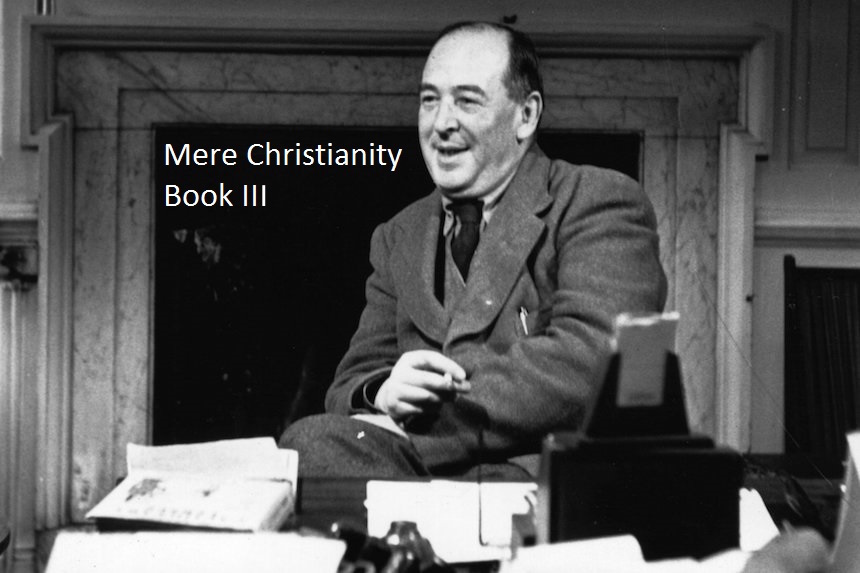Day: September 22, 2017
Mere Christianity – Book III – Chapter 11 (“Faith”)


Picking back up my notes for C.S. Lewis’ “Mere Christianity”…
Notes & Quotes
1. There are two main senses of the word “faith”
(a) Faith related to belief
“In the first sense it means simply Belief-accepting or regarding as true the doctrines of Christianity”
(i) Our relationship to reason is not what we might imagine
(A) The human mind is not controlled only by reason
“I was assuming that if the human mind once accepts a thing as true it will automatically go on regarding it as true, until some real reason for reconsidering it turns up. In fact, I was assuming that the human mind is completely ruled by reason. But that is not so”
(B) This is demonstrated in the way we behave
“…my reason is perfectly convinced by good evidence that anaesthetics do not smother me and that properly trained surgeons do not start operating until I am unconscious. But that does not alter the fact that when they have me down on the table and clap their horrible mask over my face, a mere childish panic begins inside me. I start thinking I am going to choke, and I am afraid they will start cutting me up before I am properly under. In other words, I lose my faith in anaesthetics”
(C) The battle is against emotion
“It is not reason that is taking away my faith: on the contrary, my faith is based on reason. It is my imagination and emotions. The battle is between faith and reason on one side and emotion and imagination on the other”
A call on a Catholic Answers Live episode demonstrated this point very clearly at the 18:45 mark.
(D) Very often we lose faith in our reason when confronted with emotion
“A man knows, on perfectly good evidence, that a pretty girl of his acquaintance is a liar and cannot keep a secret and ought not to be trusted; but when he finds himself with her his mind loses its faith in that bit of knowledge and he starts thinking, ‘Perhaps she’ll be different this time,’ and once more makes a fool of himself and tells her something he ought not to have told her”
(ii) We see something similar when we look at Christianity
(A) Reason is involved
“I am not asking anyone to accept Christianity if his best reasoning tells him that the weight of the evidence is against it. That is not the point at which Faith comes in”
(B) Faith (in this sense) comes in later
“But supposing a man’s reason once decides that the weight of the evidence is for it. I can tell that man what is going to happen to him in the next few weeks. There will come a moment when there is bad news, or he is in trouble, or is living among a lot of other people who do not believe it, and all at once his emotions will rise up and carry out a sort of blitz on his belief. Or else there will come a moment when he wants a woman, or wants to tell a lie, or feels very pleased with himself, or sees a chance of making a little money in some way that is not perfectly fair: some moment, in fact, at which it would be very convenient if Christianity were not true. And once again his wishes and desires will carry out a blitz. I am not talking of moments at which any real new reasons against Christianity turn up. Those have to be faced and that is a different matter. I am talking about moments where a mere mood rises up against it”
(C) Faith is a virtue as you “ride out” your changing moods
“Now Faith, in the sense in which I am here using the word, is the art of holding on to things your reason has once accepted, in spite of your changing moods. For moods will change, whatever view your reason takes. I know that by experience. Now that I am a Christian I do have moods in which the whole thing looks very improbable: but when I was an atheist I had moods in which Christianity looked terribly probable. This rebellion of your moods against your real self is going to come anyway… you can never be either a sound Christian or even a sound atheist, but just a creature dithering to and fro, with its beliefs really dependent on the weather and the state of its digestion. Consequently one must train the habit of Faith”
(D) Prayer and Church attendance aid here
“…in some of its main doctrines shall be deliberately held before your mind for some time every day. That is why daily prayers and religious reading and church going are necessary parts of the Christian life. We have to be continually reminded of what we believe. Neither this belief nor any other will automatically remain alive in the mind. It must be fed”
(E) We must beware of the slow fade
“…if you examined a hundred people who had lost their faith in Christianity, I wonder how many of them would turn out to have been reasoned out of it by honest argument? Do not most people simply drift away?”
(b) Faith related to our spiritual bankruptcy
(i) You must first really try to practise the Christian virtues
“I want to add now that the next step is to make some serious attempt to practise the Christian virtues. A week is not enough. Things often go swimmingly for the first week. Try six weeks.”
(ii) In doing so, you will see you fail
“By that time, having, as far as one can see, fallen back completely or even fallen lower than the point one began from, one will have discovered some truths about oneself. No man knows how bad he is till he has tried very hard to be good.”
(A) Good people are the ones who truly understand temptation
“Only those who try to resist temptation know how strong it is. After all, you find out the strength of the German army by fighting against it, not by giving in… A man who gives in to temptation after five minutes simply does not know what it would have been like an hour later.”
(B) Bad people don’t know much about badness
“They have lived a sheltered life by always giving in. We never find out the strength of the evil impulse inside us until we try to fight it”
(iii) This helps us discover two things:
(A) We could earn salvation
“If there was any idea that God had set us a sort of exam, and that we might get good marks by deserving them, that has to be wiped out. If there was any idea of a sort of bargain – any idea that we could perform our side of the contract and thus put God in our debts so that it was up to Him, in mere justice, to perform His side-that has to be wiped out…God has been waiting for the moment at which you discover that there is no question of earning a pass mark in this exam, or putting Him in your debt.”
(B) We could never give God anything that is not already his
“Every faculty you have, your power of thinking or of moving your limbs from moment to moment, is given you by God. If you devoted every moment of your whole life exclusively to His service you could not give Him anything that was not in a sense His own already.
It is like a small child going to its father and saying, “Daddy, give me sixpence to buy you a birthday present.” Of course, the father does, and he is pleased with the child’s present. It is all very nice and proper, but only an idiot would think that the father is sixpence to the good on the transaction. When a man has made these two discoveries God can really get to work. It is after this that real life begins. The man is awake now. We can now go on to talk of Faith in the second sense.”
Discussion Questions
1. What are the two different sense Jack puts forward regarding “faith”?
2. Do are minds work purely on reason? If not, what gets in the way?
3. How is “faith” a virtue?
4. Why does Jack think you really need to try Christianity before you can really understand the second sense of the word “faith”?
5. What conclusions can we draw from trying (and failing) to live out the Christian virtues?
C.S. Lewis Doodle
No doodle!
Bishop Barron had a podcast episode where he talks about the idea of “faith” which has a lot of overlap with Lewis.
